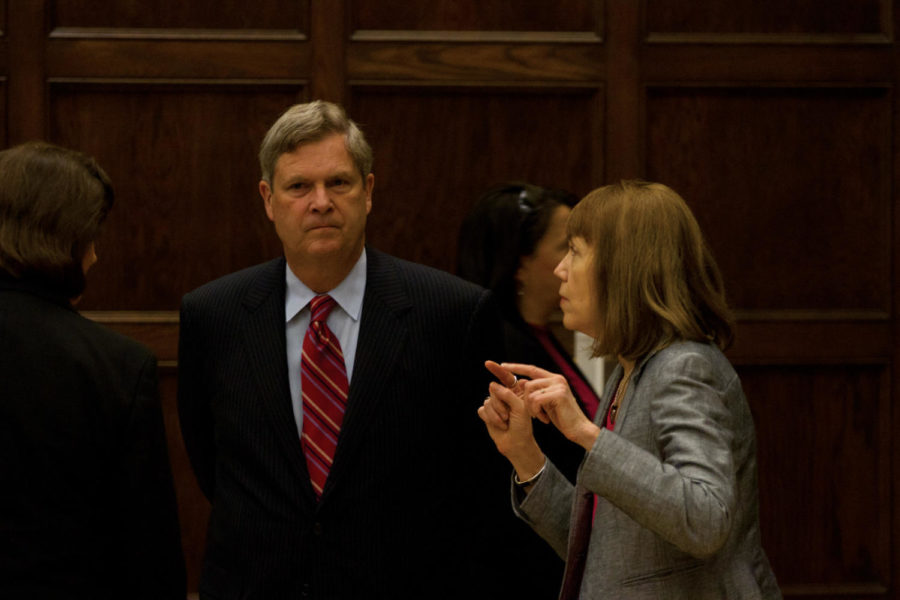Tom Vilsack: Food security is issue of national security
Former Iowa Gov. and current United States Secretary of Agriculture Tom Vilsack prepares to speak in the South Ballroom of the Memorial Union on Tuesday, Oct. 11.
October 11, 2011
Secretary of the United States Department of Agriculture Tom Vilsack urged Monday night the importance of the world producing enough food to feed its growing population.
“It’s not just a moral issue. It’s not just an economic issue. It’s not just an agricultural issue,” Vilsack said. “It’s an issue of national security.”
The former Iowa governor spoke to a large crowd in the South Ballroom in the Memorial Union as part of the World Affairs Series. Executive Vice President and Provost Elizabeth Hoffman introduced Vilsack and described Iowa State’s connection to Vilsack and the USDA.
“In recent months, Iowa State received two major grant awards from the USDA’s National Institute of Food and Agriculture in two key areas of agriculture: biofuel production and sustainability,” Hoffman said. “We appreciate USDA’s and Secretary Vilsack’s strong support of these efforts.”
After his introduction, Vilsack took the stage and began speaking about the key issue he wanted to address: food security.
“There are 925 million people in the world, on the globe, today that are undernourished,” Vilsack said. “When you consider the challenge we face over the next 30 to 40 years, with the world population increasing and the need for food having to increase by 70 percent in order to feed that ever-increasing world population, you can see that we are facing a serious long-term challenge.”
While he admitted that solving the world food shortage problem will be difficult, Vilsack said that Americans need to remember the many valuable assets the United States has.
“We have a remarkable asset in our land resources,” Vilsack said. “Our farmers, some of the most productive in the world, are capable to feed the United State’s population. That’s not true for many, many of the world’s countries today.”
Vilsack warned that although the United States has assets to deal with the world food shortage problem, success is still not guaranteed. He said he believes the United States has a responsibility to meet the challenge.
In approaching the problem, the USDA has three guiding principles, Vilsack said. He explained that the first principle has to do with innovation.
“It is our view at the USDA that research and development will help us develop the technology … that will give us the capacity to be able to produce more food even though the amount of land available to produce that food will not likely grow — in fact, it may be diminished by expanding communities, cities and towns,” he said.
Vilsack also stressed the importance of extension. He explained that the United States has teamed up with 30 other countries to form a global research alliance to discuss changing weather patterns.
“Climate change is real and we have to know that it will have an impact on our capacity to produce crops,” Vilsack said. “We have banded together with 30 different countries in this global research alliance to make sure that we do a better job coordinating our research.”
Vilsack said the USDA’s second principle is that increased productivity should not negatively affect the sustainability of natural resources. He said it is important to the USDA to focus on strategies that allow the world’s farmers to do more with less.
“It is important and necessary — country-by-country level — to look at individual challenges each country has as they relate to natural resources and food production and be able to tailor and structure an approach to those needs,” he said.
The final principle Vilsack addressed was the USDA’s efforts to empower struggling countries by allowing those countries to dictate and determine the kind and amount of aid they receive. He described the USDA’s Feed the Future program.
Vilsack said the program aims to help countries by making food available, assessable and properly utilized.
“We have to have all three,” Vilsack said. “So Feed the Future initiative is designed to address all three of those issues.”
To end his speech, Vilsack said that although solving the food shortage problem will be challenging, the United States and the rest of the world must continue to work on possible solutions.
“As concerned as folks are about extremist activity, the reality is that if we are unable to meet this challenge of global food security … we will have greater conflict,” he said. “That I am absolutely certain.”

















